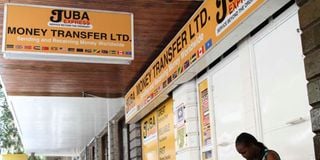S.Sudan to use $174million IMF grant to fund its budget

A money transfer outlet in South Sudan capital Juba.
What you need to know:
- In 2019, President Salva Kiir admitted that non-oil revenues were not being fully remitted into the single block account of the National Revenue Authority.
- President Kiir said the country has been unable to compensate for the fall in oil revenues with tax collections.
South Sudan unity government says it will use the recent International Monetary Fund $174.2million grant to support its budget, pay arrears and strengthen measures of addressing the ailing economy.
Addressing members of the press on Thursday in Juba, South Sudan Central Bank Governor Dier Tong acknowledged the receipt of IMF $174.2 million grant that was offered earlier this week.
“The drop in the oil prices in the international market and poor economic policies coupled with the impacts of Covid-19 and flooding across parts of the country have had a severe negative effect on the country’s economy," said Dier.
“To respond to all these challenges, and as part of our commitment to implement the economic and financial reforms outlined in the peace agreement, the Central Bank has embarked on strengthening its monetary policy framework and correcting distortions in the foreign exchange market” he said.
Dier stressed that $3 million out of the grant will be auctioned to the eligible commercial banks every week to reduce fluctuation.
Foreign exchange market
“This is an addition to the USD 2 million that will be auctioned to the Forex Bureaus every week as well. With immediate effect, banks and exchange rates will be expected to trade at the market exchange in all of their Foreign Exchange transactions. The reference market exchange rate will be published separately by the Bank of South Sudan for transactions between the government, government ministries and agencies” he added.
However, Prof. Abraham Matoc Dhal, a senior economist said the Central Bank projections would be only possible if proper economic principles to deal with inflation are adopted.
“Of course their projections are economic based facts but the issue would be when the money is diverted to different functions and use depending on powers of the authority. Money can counter the inflation difficulties only if the monetary policies are respected. These include allowing gradual modernization and liberation of the foreign exchange market” said Matoc.
In August last year, the Economic cluster chaired by Vice President Dr. James Wani Igga announced a plan to borrow $250 million from African Export and Import Bank to cover losses created by the coronavirus pandemic.
But during an extraordinary cabinet meeting two months after the appeal, the Minister of Finance Athian Diing Athian briefed the cabinet that the pan-African multilateral trade finance institution had approved the $250 million loan, with additional $63 million.
Corruption monitoring systems
The raise last year brought the total amount to $313 million to be borrowed for fixing the crumbling economy.
However, civil society activist Jame Kolok after the receipt of the loan advised the government to fix its corruption monitoring systems if the loan was to improve the feeble economy. He stressed that the cash may end in some politicians’ pocket.
A 2013 report about corruption in South Sudan, released by The Sentry, indicated that corruption spreads across all sectors of the economy and all levels of government.
It said that since independence, President Salva Kiir’s country has taken steps to promote transparency and accountability in its fight against corruption, but that a lack of capacity, resources and political will often hampers effective implementation.
In February this year, Transparency International ranked the country the second most corrupt across the globe, followed by Somalia. Syria took the lead.
Money laundering
Also in October 2020, the United Nations Commission on Human Rights accused some South Sudanese politicians and senior government officials of embezzling at least $36 million since 2016.
In December that year, The Sentry reported that some South Sudanese leaders carried out money laundering and grand corruption through networks in the United Kingdom.
In 2019, President Salva Kiir admitted that non-oil revenues were not being fully remitted into the single block account of the National Revenue Authority.
Kiir said the country has been unable to compensate for the fall in oil revenues with tax collections.
The President added that when collected and well managed, the non-oil revenue should be able to meet the government’s expenditure, including timely payment of monthly salaries.




